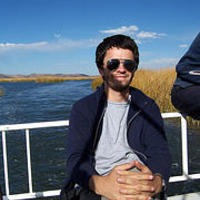Robert Wells
William Jewell College, Languages, Faculty Member
- Cultural Studies, Latin American Studies, Gilles Deleuze, Friedrich Nietzsche, Latin American literature, 20th century Avant-Garde, and 16 moreHumanism, Anti-Humanism, and Post-Humanism, Ortega y Gasset, Multitude, Roberto Arlt, Northern Soul, Masses, Crowds, Deindividuation, Felisberto Hernández, Macedonio Fernández, Peninsular Spanish Literature, Southern Cone (Area Studies), Rio de la Plata studies, Contemporary Taiwanese Fiction, Marxism, Capitalism, Vitalism, and Political Philosophyedit
- I teach classes related to Spanish language and Latin American literature, culture, and film. My research focuses pri... moreI teach classes related to Spanish language and Latin American literature, culture, and film. My research focuses primarily 20th and 21st Century Latin American Literature, Latin American and European avant-gardes, transatlantic studies, Southern Cone studies, Latin American cinema, and critical/political theory.
PhD, Romance Languages and Literatures, University of Michigan (2011)
BA, Spanish and English, University of Kansas (2004)edit
Este artículo indaga en el ensayo autobiográfico-sociológico de Eduardo Mallea, Historia de una pasión argentina, en que se destaca el enfrentamiento angustioso entre la Argentina visible y la Argentina invisible. "Enormemente popular"... more
Este artículo indaga en el ensayo autobiográfico-sociológico de Eduardo Mallea, Historia de una pasión argentina, en que se destaca el enfrentamiento angustioso entre la Argentina visible y la Argentina invisible. "Enormemente popular" cuando fue publicado en 1937 durante el apogeo de la década infame, las tesis tan apasionadas como autoritarias de Mallea se encuadran con las mismas del filósofo español, José Ortega y Gasset, sobre Argentina, su tal "segunda patria". Entonces, se plantea aquí que la historia nacional argentina sobre la cual escribe Mallea - cuyas pasiones afectivas serán denominadas como "humanistas" en el sentido originario romano y también "tristes" en el sentido elaborado por Baruch Spinoza - no es meramente elitista y espiritualista sino reaccionaria, racista, y xenofóbica. Por ende, se evidenciará cómo el ideario malleano efectivamente estetiza la retórica nacionalista argentina que marca la época. Palabras clave: Mallea, Ortega, Sur, Década infame, nacionalismo argentino.
Research Interests:
Research Interests:
Research Interests:
Research Interests:
Research Interests:
Research Interests:
This dissertation treats the narrative fiction, philosophical essays, and the revistas (cultural/aesthetic/philosophical journals) published and disseminated by the Argentine and Spanish avant-gardes between 1918 and 1936. I argue that... more
This dissertation treats the narrative fiction, philosophical essays, and the revistas (cultural/aesthetic/philosophical journals) published and disseminated by the Argentine and Spanish avant-gardes between 1918 and 1936. I argue that the multifaceted relationships formed within this cross-cultural exchange are constituitive of a transatlantic avant-garde assemblage. The key compositors in this assemblage's constitution are Ramón Gómez de la Serna, Jorge Luis Borges, and José Ortega y Gasset. Additionally, the transatlantic revista, Síntesis, is presented as a case study that confirms my hypothesis regarding the transatlantic nature of this specific avant-garde assemblage.
Within this assemblage, the avant-garde's aesthetic expressions and philosophical figurations of the human provide it its unique composition and consistency. As I further submit, avant-garde notions regarding the relationship between the human and the aesthetic can often be genealogically traced to German humanistic and anti-humanistic philosophies, such as those that emerge out of Kant's Critique of Judgment, Schiller's On the Aesthetic Education of Man, and Nietzsche's general ouevre.
A thinker trained in German philosophy, Ortega acts as the primary transatlantic avant-garde figure that rides an alternately transparent and turbid wave of thought and practice revolving around the human. In El tema de nuestro tiempo, La deshumanización del arte, and La rebelión de las masas, Ortega complicates and radicalizes certain humanistic concepts in the name of dehumanized aesthetics, hierarchical order, and reactionary politics. Ortega's influence in Argentina can be seen in the work of Eduardo Mallea, whose book, Historia de una pasión argentina, recapitulates many of Ortega's basic theses.
Many other vanguardists receive racical ideas from both their avant-garde contemporaries and from the German philosophical tradition, though not all follow Ortega down a path toward conservatism. The Spanish writer, Pedro Salinas, utilizes a dehumanized aesthetic technique in Víspera del gozo , but does so in order to critique Ortega's limited epistemological approach. Meanwhile, the Argentine novelists, Roberto Arlt and Macedonio Fernández, propose their own radical alternatives in hopes of freeing life from such limited models. Arlt does so in El juguete rabioso, Los siete locos, and Los lanzallamas, while Macedonio does so Adriana Buenos Aires and Museo de la Novela de la Eterna.
Within this assemblage, the avant-garde's aesthetic expressions and philosophical figurations of the human provide it its unique composition and consistency. As I further submit, avant-garde notions regarding the relationship between the human and the aesthetic can often be genealogically traced to German humanistic and anti-humanistic philosophies, such as those that emerge out of Kant's Critique of Judgment, Schiller's On the Aesthetic Education of Man, and Nietzsche's general ouevre.
A thinker trained in German philosophy, Ortega acts as the primary transatlantic avant-garde figure that rides an alternately transparent and turbid wave of thought and practice revolving around the human. In El tema de nuestro tiempo, La deshumanización del arte, and La rebelión de las masas, Ortega complicates and radicalizes certain humanistic concepts in the name of dehumanized aesthetics, hierarchical order, and reactionary politics. Ortega's influence in Argentina can be seen in the work of Eduardo Mallea, whose book, Historia de una pasión argentina, recapitulates many of Ortega's basic theses.
Many other vanguardists receive racical ideas from both their avant-garde contemporaries and from the German philosophical tradition, though not all follow Ortega down a path toward conservatism. The Spanish writer, Pedro Salinas, utilizes a dehumanized aesthetic technique in Víspera del gozo , but does so in order to critique Ortega's limited epistemological approach. Meanwhile, the Argentine novelists, Roberto Arlt and Macedonio Fernández, propose their own radical alternatives in hopes of freeing life from such limited models. Arlt does so in El juguete rabioso, Los siete locos, and Los lanzallamas, while Macedonio does so Adriana Buenos Aires and Museo de la Novela de la Eterna.
